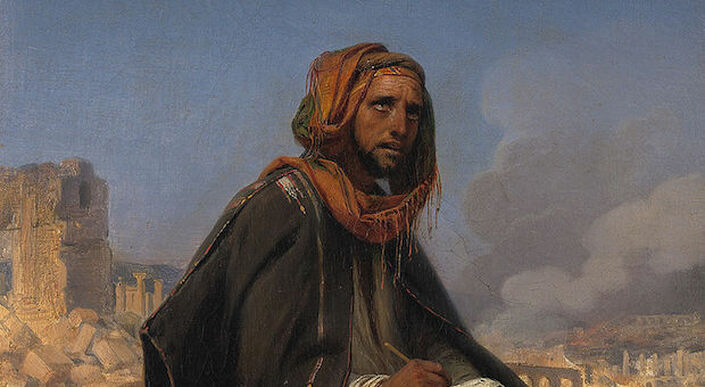|
Jeremiah 11:18-20 (NRSVCE) It was the Lord who made it known to me, and I knew; then you showed me their evil deeds. But I was like a gentle lamb led to the slaughter. And I did not know it was against me that they devised schemes, saying, “Let us destroy the tree with its fruit, let us cut him off from the land of the living, so that his name will no longer be remembered!” But you, O Lord of hosts, who judge righteously, who try the heart and the mind, let me see your retribution upon them, for to you I have committed my cause. The prayer of Jeremiah is difficult to contend with. It appears that Jeremiah is yearning for vengeance. God has revealed to him that the people who he is supposed to preach to are planning evil things, and even planning to have him killed. They plan to “destroy the tree with its fruit,” to cut Jeremiah down in his prime. So Jeremiah prays that God will make retribution on them, and even more, he prays that he can witness that retribution. That certainly sounds like Jeremiah desiring vengeance to me. The trouble is that vengeance is not something I typically associate with righteousness or virtue. Justice, sure. But vengeance carries with it a connotation of a personal slight. “You have wronged me, and I want to hurt you for it. Not because it is just, but because I want you to hurt like I hurt.” We can of course quibble about what “vengeance” may mean, but the point is that in a first look at this verse, that’s the sense I get from Jeremiah. The people have planned to make him suffer, and so he wants to see them suffer. And that seems morally wrong.
But is that really what’s going on here? Jeremiah calls himself a lamb being led to the slaughter. That could just be a complaint. “You sent me to do this, Lord, and you knew they would want to kill me!” And it is that, but it also reveals how Jeremiah views his role as a prophet. He is a lamb, following the direction of his shepherd. He knows it’s not his place to determine where he goes or what he does. He places all his trust in God, and despite the new revelation that he may die for it, he will continue to follow the direction of his shepherd. Because he knows that the shepherd is the ultimate authority. He also knows that he has much more to do as a prophet. He is still producing fruits! Why would God allow a fruitful tree to be cut down?! Beyond his complaints, though, look at his plea. He starts with an acknowledgment that only God judges righteously—the implication being that Jeremiah cannot judge these people despite what God has revealed about their intentions, because he is not the righteous judge. He also specifically says not his own vengeance, but God’s retribution (other translations use “vengeance” there as well). God’s vengeance is not driven by passion, like man’s is. It is not inordinate, seeking to punish more than is deserved. God is the righteous judge, and therefore His vengeance is just. Jeremiah is aware that, though he be a righteous man, a faithful lamb to the shepherd, his sense of justice is not good enough to carry out judgment. Only God can execute that judgment. Lastly, he finishes his plea with “for to you I have committed my cause.” Everything Jeremiah does is because God has set him on this path. God has made him a prophet, and it is a prophet’s role to be faithful lambs, even faithful lambs willing to be led to the slaughter. Jeremiah is not worried about himself, as his complaint may seem at first. He is worried about the cause God has set him toward. He is still bearing fruit! The task given to him is not yet completed! His plea with God is not for his own life, or to right a personal slight against him. His plea is that the cause may continue, for God’s sake. He is not praying “You sent me here to die. Save me, and let me see those who wronged me suffer as they meant for me to suffer!” It is rather “Execute your divine justice, Lord, so that I may continue to bear fruit for you.” That’s not vengeance at all. That’s humility and faithfulness. |
ArchivesCategories
All
|

 RSS Feed
RSS Feed